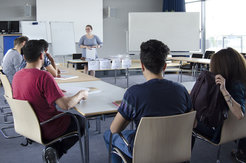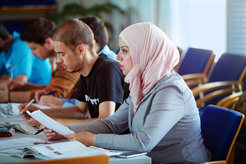Arabic-German for beginners: How the brain learns a new language most effectively
Language is considered as the key to integration. But how can a new language be learned in the most effective way, and which changes take place in the brain during this process? As part of a large-scale study involving young Syrians, which started at the beginning of May, researchers at the Max Planck Institute for Human Cognitive and Brain Sciences in Leipzig and the Herder Institute at the University of Leipzig are examining these questions. Not only could the findings lead to a better understanding of how the human brain processes language learning, but they could also be used to optimise language courses and overcome linguistic barriers more efficiently.

"You have to step to the right", Hiba signals to her classmate Husam who is holding a sign that says "Leipzig". She carefully moves him between two other students who are also holding cards with sentences written on them. "I'm from Syria, but I live in Leipzig now." Hiba goes on to read the complete sentence that she made with the help of her classmates at the Max Planck Institute for Human Cognitive and Brain Sciences (MPI CBS) in Leipzig. In the next room there's a similar scene, but instead of subject–verb–object constructions, they are using cards displaying nouns, such as "street", "house" and "tree" – vocabulary for the theme "city".
Two German courses taught by native speakers of Arabic, two different methods, and one common goal. While one course focuses on German grammar and syntax, the other concentrates on vocabulary, semantics and communication. Through magnetic resonance imaging (MRI) before, during and after the course scientists are able to to study changes in the brain while a new language is being learned and how this particular teaching method influences brain structures.
The human brain's high level of plasticity enables it to adapt to environmental demands. Therefore, every child has the potential to learn any language. Neuroscientists at MPI CBS are eager to find out whether this is also the case for learning a second language. "In studies on the acquisition of new skills in adults, it was shown that the cerebal cortex and connections in the brain modifies its plasticity", says head of the study Tómas Goucha. "We therefore expect that intensive language training shapes the brain in response to the demands of the new language."
So far, there has been very little investigation into how the brain changes alters while learning a new language in comparison to our mother tongue and how it reflects specific features of the new language – be they unknown grammatical structures or relationships between word meanings. The switch between two fundamentally different languages, Arabic and German, offers an especially interesting research project. "We suspect it is not only brain structures that alter while learning another language, but the language areas responsible for grammar and vocabulary in one's mother tongue might also adapt to meet the requirements of the new language—especially those that process complex German grammar, and this could depend on the teaching method", explains the neuroscientists.

The neuroscientists aim to address these questions by researching language learning in ninety Syrian learners with no knowledge of German, but who would like to study in Germany. Through a six-month language course at MPI CBS, either focusing on grammar or semantics, the young students will be guided through classes - each consisting of fifteen participants - with the aim of attaining a high language level. After three months and a second MRI scan the contents of both courses will be adapted to ensure that every participant reaches an equally high level so that they can use German independently and creatively.
"If we succeed in observing how the brain changes while studying a new language intensively, we would have a better understanding of how learning another language is processed", says Professor Angela D. Friederici, renowned linguist and director at MPI CBS. Professor Christian Fandrych, head of the Herder Institute, adds: "Such neuro-scientific insights could not only offer a better understanding of the processes that take place when learning a language through lessons but could also improve didactical concepts." For the vast number of refugees who would like to learn German to a high standard and in the fastest way possible, such studies are indispensable and the results more important than ever.
New language courses will be starting shortly. Syrian speakers who would like to learn German, please contact our study coordinator Matthias Schwendemann.













